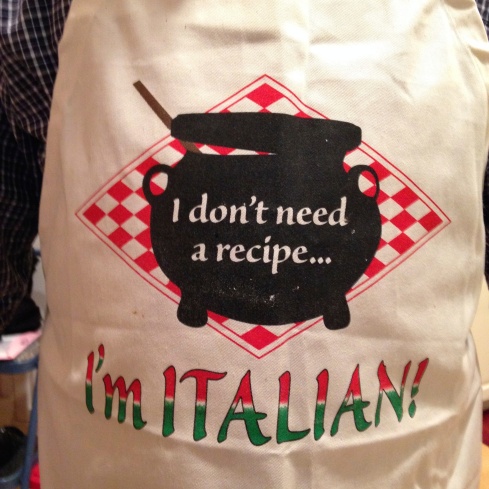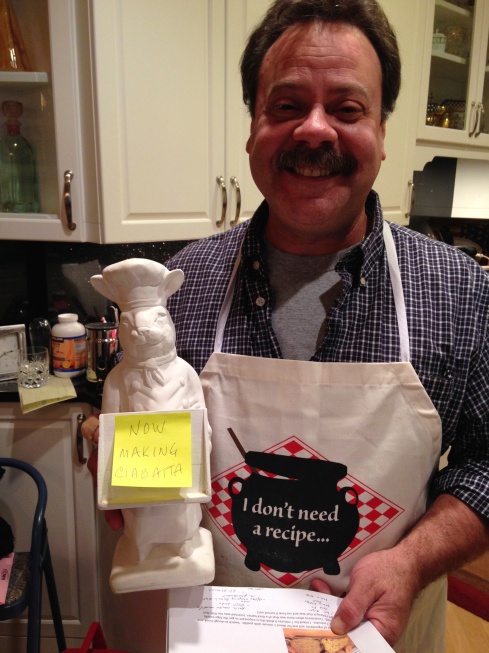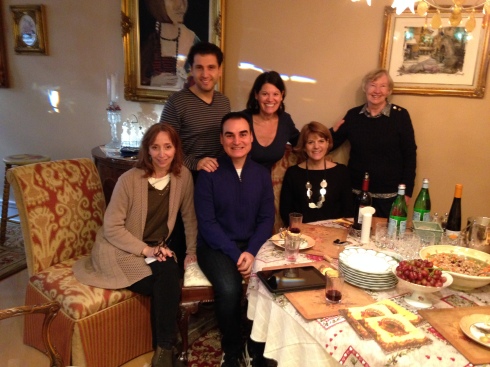What to do on a cold Saturday afternoon? Attend a pizza/ciabatta/focaccia class in my own home!
When I introduced Giovanni from my Italian class to my husband Leonardo, it was the beginning of a beautiful culinary relationship. Leonardo has long sought to perfect his pizza dough, ever since our trip to Napoli, and Giovanni is ever in search of the perfect ciabatta and focaccia. Hence, a joining of forces and a great learning and eating treat for those of us in the gallery.
As dough rising is a many hour event, we were fortunate that Leonardo had made a few pizzas for us to enjoy during the lessons.
Giovanni began with focaccia.
He loved my apron, so I let him borrow it for the day.
His recipe includes bread flour, yeast, salt, sugar and a potato;
and then a lot of patience waiting for the dough to rise before gently pressing it in his well worn pan.
He then tops it with tomatoes and oregano and a bit of oil.
After more rising and then cooking it in a hot oven for 30-40 minutes, the result is a focaccia with a crunchy, tasty crust and a fluffy chewy inside. Delicious!
While the focaccia was rising, Giovanni started the next lesson: how to make ciabatta.
Unlike the focaccia, this starts with a BIGA or starter (yeast, water and flour) that is made well in advance.
Flour is added to the starter, and after a few hours wait, it doubles in size.
While waiting for Giovanni’s focaccia to rise, Leonardo began teaching us how to make pizza dough.
Getting the yeast right is all important. Not too hot and not too cold or it won’t proof.
He uses a blender to mix the 00 flour, yeast, salt and water.
Like the other doughs, it then begins the slow rising ritual. When it has risen, Leonardo divides the dough and begins making pizzas.
He tops them with a variety of things his “customers” request…this one had anchovies (yikes) onions and capers.
My favorite is sautéed onions and peppers. Soooo good and cooked to perfection!
With the pizzas gone, (yes, we ate them all!), time to return to finishing the ciabattas. We learned from Giovanni not to handle the dough much and unlike pizza, not to fold it. Giovanni cut the dough gently in the right shape and “gingerly” placed each one on parchment paper.
After a bit more rising, they were baked in a hot oven until golden brown.
We filled these with cheeses and meats, and yes, we ate them too! Warm and wonderful with the coveted holes in the bread.
Italian language class in the morning. Bread making in the afternoon. All in a day’s work – filled with friends, food, fun, and lots of vino! (Giovanna, sorry you missed the photo op.)
Thanks Leonardo and Giovanni for a wonderful class. We learned a lot, but mostly we learned that we love to eat whatever you cook!
Hmmm…I think there’s a business here!
Ciao,
Judy
























Fabulous Leonardo and Judy!!!! My mouth was wAtering for pizza !!!
The ciabatta sandwiches looked delish 🇮🇹🇮🇹🇮🇹
LikeLike
And I thought I was the only one taking Italian. My self-taught way keeps the weight down though. I don’t know how you do it Judy – you eat so many fantastic things but stay looking fabulous.
Have you thought of putting together a cookbook? How To Eat Italian and Stay Slim.
LikeLike
Thanks! I love the cookbook idea. The Italians seem to have mastered this…I think it has to do with everything being so fresh – not frozen, not bought in containers, and not fried fast food!
LikeLike
I agree. I think there is such an emphasis on vegetables that counters the carbs that makes everything amazing! I have two versions of Tuscany soup cooking on my stove right now that I bought all farmer’s market veggies for yesterday.
Why two? I have a vegetarian son but couldn’t resist the sausage version for myself.
I’m heading to Cortona for the fall harvest next year. Can’t wait.
LikeLike
Judy, I just had an idea for you. E-mail me. And thanks for the intro to my fellow Californian, Yvonne.
LikeLike